高三英语情态动词技巧(很有用)及练习题
- 格式:doc
- 大小:69.50 KB
- 文档页数:13
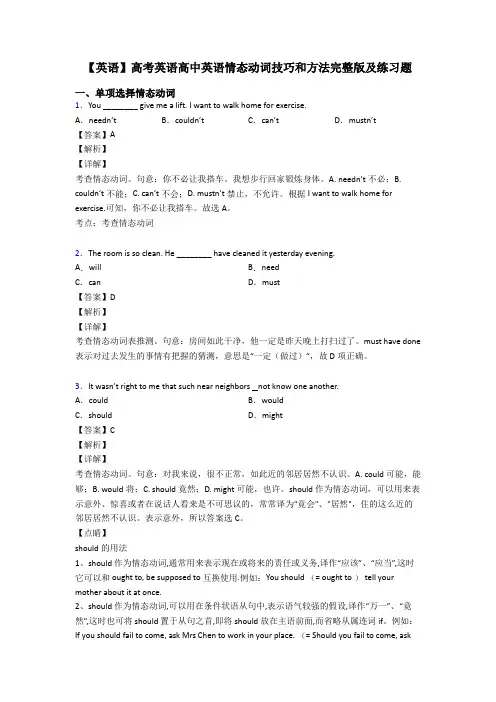
【英语】高考英语高中英语情态动词技巧和方法完整版及练习题一、单项选择情态动词1.You ________ give me a lift. I want to walk home for exercise.A.needn’t B.couldn’t C.can’t D.mustn’t【答案】A【解析】【详解】考查情态动词。
句意:你不必让我搭车。
我想步行回家锻炼身体。
A. needn’t不必;B. couldn’t不能;C. can’t不会;D. mustn’t禁止,不允许。
根据I want to walk home for exercise.可知,你不必让我搭车。
故选A。
考点:考查情态动词2.The room is so clean. He ________ have cleaned it yesterday evening.A.will B.needC.can D.must【答案】D【解析】【详解】考查情态动词表推测。
句意:房间如此干净,他一定是昨天晚上打扫过了。
must have done 表示对过去发生的事情有把握的猜测,意思是“一定(做过)”,故D项正确。
3.It wa sn’t right to me that such near neighbors not know one another.A.could B.wouldC.should D.might【答案】C【解析】【详解】考查情态动词。
句意:对我来说,很不正常,如此近的邻居居然不认识。
A. could可能,能够;B. would将;C. should竟然;D. might可能,也许。
should 作为情态动词,可以用来表示意外、惊喜或者在说话人看来是不可思议的,常常译为"竟会"、"居然",住的这么近的邻居居然不认识。
表示意外,所以答案选C。
【点睛】should的用法1、should 作为情态动词,通常用来表示现在或将来的责任或义务,译作“应该”、“应当”,这时它可以和 ought to, be supposed to 互换使用.例如:You should (= ought to ) tell your mother about it at once.2、should 作为情态动词,可以用在条件状语从句中,表示语气较强的假设,译作“万一”、“竟然”,这时也可将 should 置于从句之首,即将 should 放在主语前面,而省略从属连词 if。
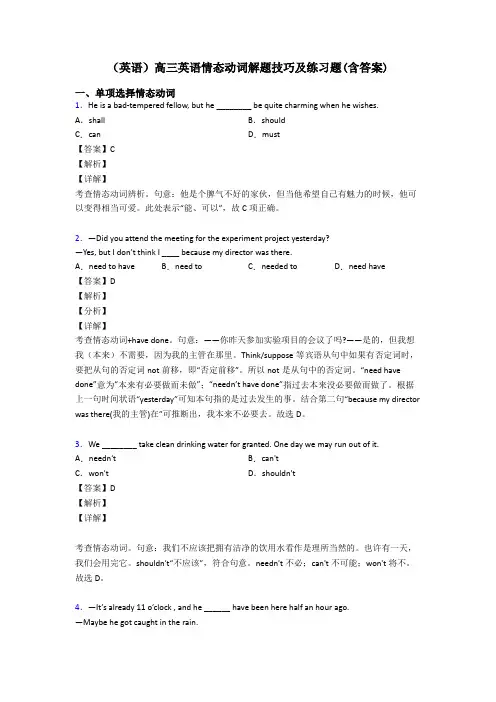
(英语)高三英语情态动词解题技巧及练习题(含答案)一、单项选择情态动词1.He is a bad-tempered fellow, but he ________ be quite charming when he wishes.A.shall B.shouldC.can D.must【答案】C【解析】【详解】考查情态动词辨析。
句意:他是个脾气不好的家伙,但当他希望自己有魅力的时候,他可以变得相当可爱。
此处表示“能、可以”,故C项正确。
2.—Did you attend the meeting for the experiment project yesterday?—Yes, but I don’t think I ____ because my director was there.A.need to have B.need to C.needed to D.need have【答案】D【解析】【分析】【详解】考查情态动词+have done。
句意:——你昨天参加实验项目的会议了吗?——是的,但我想我(本来)不需要,因为我的主管在那里。
Think/suppose等宾语从句中如果有否定词时,要把从句的否定词not前移,即“否定前移”。
所以not是从句中的否定词。
“need have done”意为“本来有必要做而未做”;“needn’t have done”指过去本来没必要做而做了。
根据上一句时间状语“yesterday”可知本句指的是过去发生的事。
结合第二句“because my director was there(我的主管)在”可推断出,我本来不必要去。
故选D。
3.We ________ take clean drinking water for granted. One day we may run out of it. A.needn't B.can'tC.won't D.shouldn't【答案】D【解析】【详解】考查情态动词。
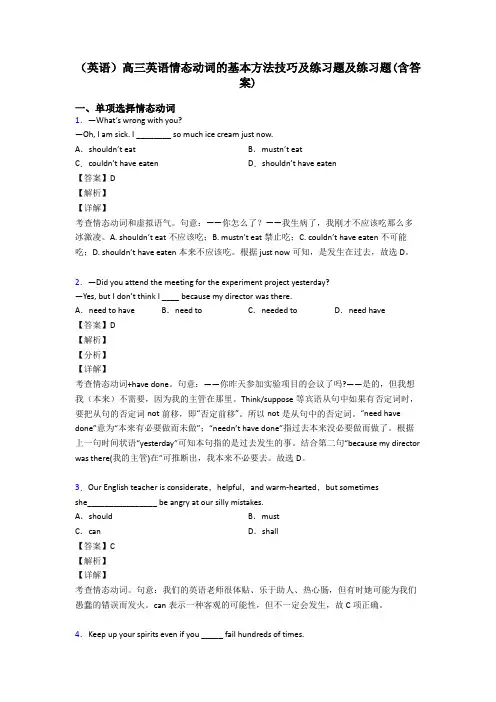
(英语)高三英语情态动词的基本方法技巧及练习题及练习题(含答案)一、单项选择情态动词1.—What’s wrong with you?—Oh, I am sick. I ________ so much ice cream just now.A.shouldn’t eat B.mustn’t eatC.couldn’t have eaten D.shouldn’t have eaten【答案】D【解析】【详解】考查情态动词和虚拟语气。
句意:——你怎么了?——我生病了,我刚才不应该吃那么多冰激凌。
A. shouldn’t eat不应该吃;B. mustn’t eat禁止吃;C. couldn’t have eaten不可能吃;D. shouldn’t have eaten本来不应该吃。
根据just now可知,是发生在过去,故选D。
2.—Did you attend the meeting for the experiment project yesterday?—Yes, but I don’t think I ____ because my director was there.A.need to have B.need to C.needed to D.need have【答案】D【解析】【分析】【详解】考查情态动词+have done。
句意:——你昨天参加实验项目的会议了吗?——是的,但我想我(本来)不需要,因为我的主管在那里。
Think/suppose等宾语从句中如果有否定词时,要把从句的否定词not前移,即“否定前移”。
所以not是从句中的否定词。
“need have done”意为“本来有必要做而未做”;“needn’t have done”指过去本来没必要做而做了。
根据上一句时间状语“yesterday”可知本句指的是过去发生的事。
结合第二句“because my director was there(我的主管)在”可推断出,我本来不必要去。
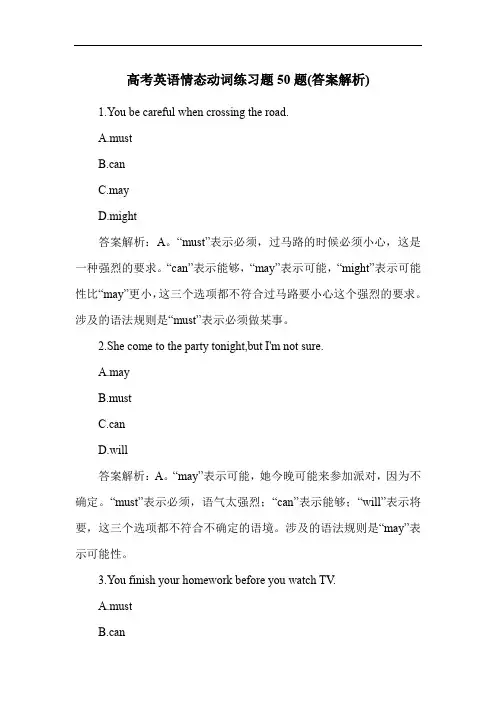
高考英语情态动词练习题50题(答案解析)1.You be careful when crossing the road.A.mustB.canC.mayD.might答案解析:A。
“must”表示必须,过马路的时候必须小心,这是一种强烈的要求。
“can”表示能够,“may”表示可能,“might”表示可能性比“may”更小,这三个选项都不符合过马路要小心这个强烈的要求。
涉及的语法规则是“must”表示必须做某事。
2.She come to the party tonight,but I'm not sure.A.mayB.mustC.canD.will答案解析:A。
“may”表示可能,她今晚可能来参加派对,因为不确定。
“must”表示必须,语气太强烈;“can”表示能够;“will”表示将要,这三个选项都不符合不确定的语境。
涉及的语法规则是“may”表示可能性。
3.You finish your homework before you watch TV.A.mustB.canC.mayD.might答案解析:A。
“must”表示必须,先完成作业才能看电视,是一种规定。
“can”表示能够,“may”表示可能,“might”表示可能性比“may”更小,这三个选项都不符合规定的语境。
涉及的语法规则是“must”用于表示必须做某事。
4.He be very tired after a long day at work.A.mustB.canC.mayD.might答案解析:A。
工作了一整天后他肯定很累,“must”表示肯定的推测。
“can”表示能够,“may”表示可能,“might”表示可能性比“may”更小,这三个选项都不如“must”的推测强烈。
涉及的语法规则是“must”表示肯定的推测。
5.We take an umbrella.It might rain later.A.mustB.canC.mayD.should答案解析:D。
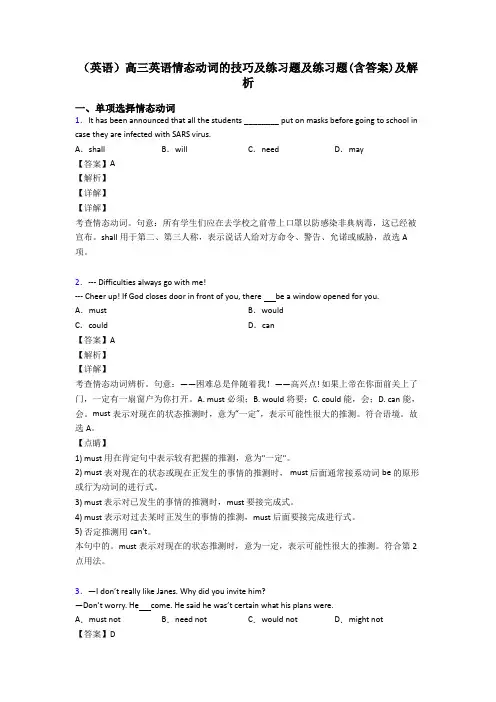
(英语)高三英语情态动词的技巧及练习题及练习题(含答案)及解析一、单项选择情态动词1.It has been announced that all the students ________ put on masks before going to school in case they are infected with SARS virus.A.shall B.will C.need D.may【答案】A【解析】【详解】【详解】考查情态动词。
句意:所有学生们应在去学校之前带上口罩以防感染非典病毒,这已经被宣布。
shall用于第二、第三人称,表示说话人给对方命令、警告、允诺或威胁,故选A 项。
2.--- Difficulties always go with me!--- Cheer up! If God closes door in front of you, there be a window opened for you. A.must B.wouldC.could D.can【答案】A【解析】【详解】考查情态动词辨析。
句意:——困难总是伴随着我!——高兴点! 如果上帝在你面前关上了门,一定有一扇窗户为你打开。
A. must必须;B. would将要;C. could能,会;D. can能,会。
must表示对现在的状态推测时,意为“一定”,表示可能性很大的推测。
符合语境。
故选A。
【点睛】1) must用在肯定句中表示较有把握的推测,意为"一定"。
2) must表对现在的状态或现在正发生的事情的推测时, must 后面通常接系动词be 的原形或行为动词的进行式。
3) must 表示对已发生的事情的推测时,must 要接完成式。
4) must表示对过去某时正发生的事情的推测,must 后面要接完成进行式。
5) 否定推测用can't。
本句中的。
must表示对现在的状态推测时,意为一定,表示可能性很大的推测。
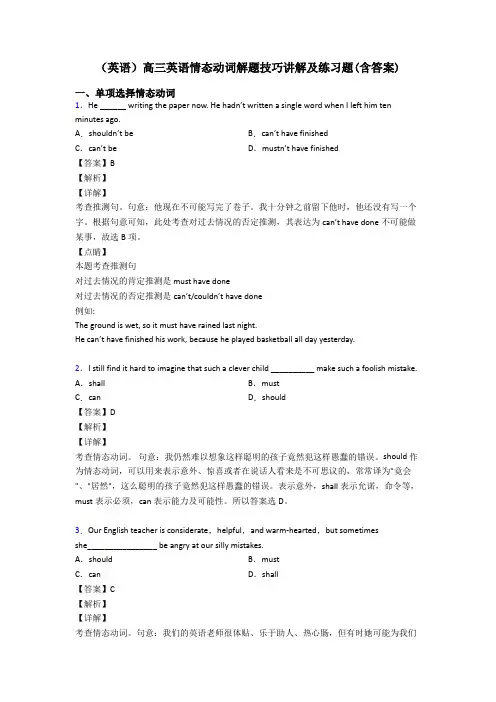
(英语)高三英语情态动词解题技巧讲解及练习题(含答案)一、单项选择情态动词1.He ______ writing the paper now. He hadn’t written a single word when I left him ten minutes ago.A.shouldn’t be B.can’t have finishedC.can’t be D.mustn’t have finished【答案】B【解析】【详解】考查推测句。
句意:他现在不可能写完了卷子。
我十分钟之前留下他时,他还没有写一个字。
根据句意可知,此处考查对过去情况的否定推测,其表达为can’t have done不可能做某事,故选B项。
【点睛】本题考查推测句对过去情况的肯定推测是must have done对过去情况的否定推测是can’t/couldn’t have done例如:The ground is wet, so it must have rained last night.He can’t have finished his work, because he played baske tball all day yesterday.2.I still find it hard to imagine that such a clever child __________ make such a foolish mistake. A.shall B.mustC.can D.should【答案】D【解析】【详解】考查情态动词。
句意:我仍然难以想象这样聪明的孩子竟然犯这样愚蠢的错误。
should 作为情态动词,可以用来表示意外、惊喜或者在说话人看来是不可思议的,常常译为"竟会"、"居然",这么聪明的孩子竟然犯这样愚蠢的错误。
表示意外,shall表示允诺,命令等,must表示必须,can表示能力及可能性。
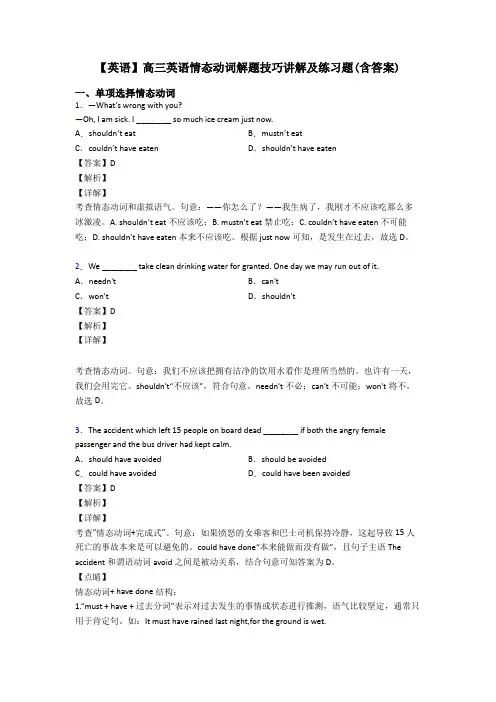
【英语】高三英语情态动词解题技巧讲解及练习题(含答案)一、单项选择情态动词1.—What’s wrong with you?—Oh, I am sick. I ________ so much ice cream just now.A.shouldn’t eat B.mustn’t eatC.couldn’t have eaten D.shouldn’t have eaten【答案】D【解析】【详解】考查情态动词和虚拟语气。
句意:——你怎么了?——我生病了,我刚才不应该吃那么多冰激凌。
A. shouldn’t eat不应该吃;B. mustn’t eat禁止吃;C. couldn’t have eaten不可能吃;D. shouldn’t have eaten本来不应该吃。
根据just now可知,是发生在过去,故选D。
2.We ________ take clean drinking water for granted. One day we may run out of it. A.needn't B.can'tC.won't D.shouldn't【答案】D【解析】【详解】考查情态动词。
句意:我们不应该把拥有洁净的饮用水看作是理所当然的。
也许有一天,我们会用完它。
shouldn't“不应该”,符合句意。
needn't不必;can't不可能;won't将不。
故选D。
3.The accident which left 15 people on board dead ________ if both the angry female passenger and the bus driver had kept calm.A.should have avoided B.should be avoidedC.could have avoided D.could have been avoided【答案】D【解析】【详解】考查“情态动词+完成式”。
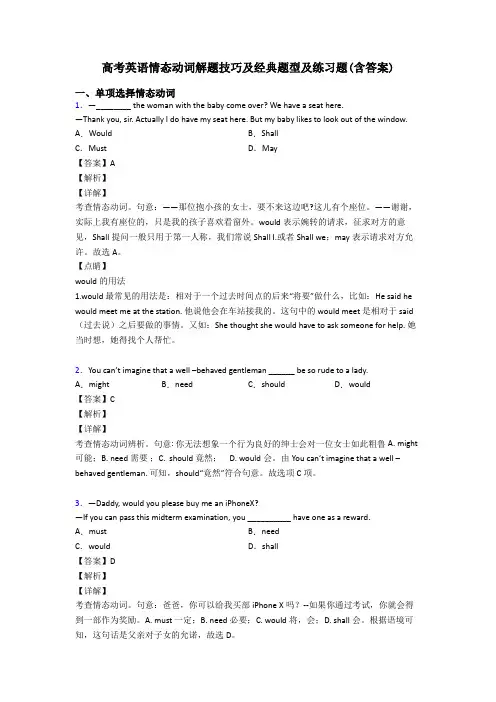
高考英语情态动词解题技巧及经典题型及练习题(含答案)一、单项选择情态动词1.—________ the woman with the baby come over? We have a seat here.—Thank you, sir. Actually I do have my seat here. But my baby likes to look out of the window. A.Would B.ShallC.Must D.May【答案】A【解析】【详解】考查情态动词。
句意:——那位抱小孩的女士,要不来这边吧?这儿有个座位。
——谢谢,实际上我有座位的,只是我的孩子喜欢看窗外。
would表示婉转的请求,征求对方的意见,Shall提问一般只用于第一人称,我们常说Shall I.或者 Shall we;may表示请求对方允许。
故选A。
【点睛】would的用法1.would 最常见的用法是:相对于一个过去时间点的后来“将要”做什么,比如:He said he would meet me at the station. 他说他会在车站接我的。
这句中的 would meet 是相对于 said (过去说)之后要做的事情。
又如:She thought she would have to ask someone for help. 她当时想,她得找个人帮忙。
2.You can’t imagine that a well –behaved gentleman ______ be so rude to a lady.A.might B.need C.should D.would【答案】C【解析】【详解】考查情态动词辨析。
句意: 你无法想象一个行为良好的绅士会对一位女士如此粗鲁A. might 可能;B. need需要;C. should竟然; D. would会。
由You can’t imagine that a well –behaved gentleman. 可知,should“竟然”符合句意。
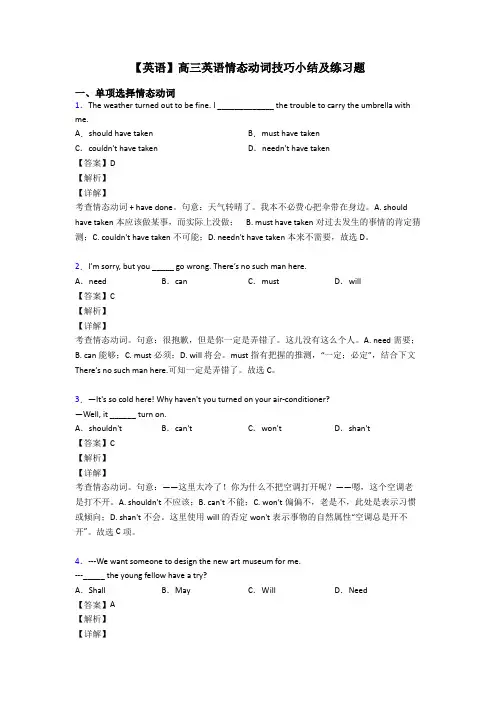
【英语】高三英语情态动词技巧小结及练习题一、单项选择情态动词1.The weather turned out to be fine. I _____________ the trouble to carry the umbrella with me.A.should have taken B.must have takenC.couldn't have taken D.needn't have taken【答案】D【解析】【详解】考查情态动词 + have done。
句意:天气转晴了。
我本不必费心把伞带在身边。
A. should have taken本应该做某事,而实际上没做; B. must have taken对过去发生的事情的肯定猜测;C. couldn't have taken不可能;D. needn't have taken本来不需要,故选D。
2.I’m sorry, but you _____ go wrong. There’s no such man here.A.need B.can C.must D.will【答案】C【解析】【详解】考查情态动词。
句意:很抱歉,但是你一定是弄错了。
这儿没有这么个人。
A. need需要;B. can能够;C. must必须;D. will将会。
must指有把握的推测,“一定;必定”,结合下文There’s no such man here.可知一定是弄错了。
故选C。
3.—It's so cold here! Why haven't you turned on your air-conditioner?—Well, it ______ turn on.A.shouldn't B.can't C.won't D.shan't【答案】C【解析】【详解】考查情态动词。
句意:——这里太冷了!你为什么不把空调打开呢?——嗯,这个空调老是打不开。
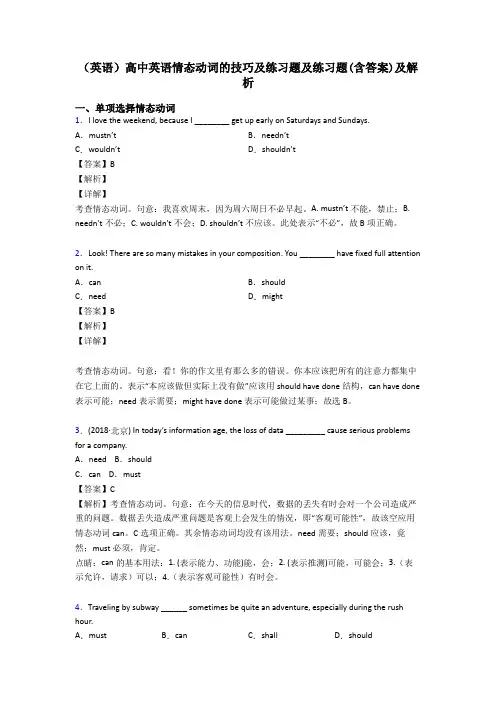
(英语)高中英语情态动词的技巧及练习题及练习题(含答案)及解析一、单项选择情态动词1.I love the weekend, because I ________ get up early on Saturdays and Sundays. A.mustn’t B.needn’tC.wouldn’t D.shouldn’t【答案】B【解析】【详解】考查情态动词。
句意:我喜欢周末,因为周六周日不必早起。
A. mustn’t不能,禁止;B. needn’t不必;C. wouldn’t不会;D. shouldn’t不应该。
此处表示“不必”,故B项正确。
2.Look! There are so many mistakes in your composition. You ________ have fixed full attention on it.A.can B.shouldC.need D.might【答案】B【解析】【详解】考查情态动词。
句意:看!你的作文里有那么多的错误。
你本应该把所有的注意力都集中在它上面的。
表示“本应该做但实际上没有做”应该用should have done结构,can have done 表示可能;need表示需要;might have done表示可能做过某事;故选B。
3.(2018·北京) In today’s information age, the loss of data _________ cause serious problems for a company.A.need B.shouldC.can D.must【答案】C【解析】考查情态动词。
句意:在今天的信息时代,数据的丢失有时会对一个公司造成严重的问题。
数据丢失造成严重问题是客观上会发生的情况,即“客观可能性”,故该空应用情态动词can。
C选项正确。
其余情态动词均没有该用法。
need需要;should应该,竟然;must必须,肯定。
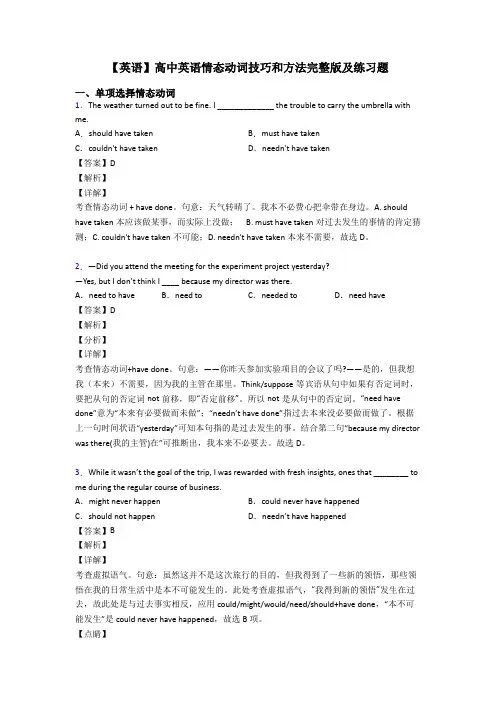
【英语】高中英语情态动词技巧和方法完整版及练习题一、单项选择情态动词1.The weather turned out to be fine. I _____________ the trouble to carry the umbrella with me.A.should have taken B.must have takenC.couldn't have taken D.needn't have taken【答案】D【解析】【详解】考查情态动词 + have done。
句意:天气转晴了。
我本不必费心把伞带在身边。
A. should have taken本应该做某事,而实际上没做; B. must have taken对过去发生的事情的肯定猜测;C. couldn't have taken不可能;D. needn't have taken本来不需要,故选D。
2.—Did you attend the meeting for the experiment project yesterday?—Yes, but I don’t think I ____ because my di rector was there.A.need to have B.need to C.needed to D.need have【答案】D【解析】【分析】【详解】考查情态动词+have done。
句意:——你昨天参加实验项目的会议了吗?——是的,但我想我(本来)不需要,因为我的主管在那里。
Think/suppose等宾语从句中如果有否定词时,要把从句的否定词not前移,即“否定前移”。
所以not是从句中的否定词。
“need have done”意为“本来有必要做而未做”;“needn’t have done”指过去本来没必要做而做了。
根据上一句时间状语“yesterday”可知本句指的是过去发生的事。
高考英语情态动词推测运用练习题50题(答案解析)1.She be at home. I just saw her leave.A.mustn'tB.can'tC.shouldn'tD.needn't答案解析:B。
can't 表示“不可能”,根据后句“我刚看到她离开”可知她不可能在家。
mustn't 表示“禁止”;shouldn't 表示“不应该”;needn't 表示“不必”。
2.He be very tired. He has been working all day.A.mustB.canC.shouldD.need答案解析:A。
must 表示肯定的推测“一定”,因为他一整天都在工作,所以一定很累。
can 表示“可能”,语气较弱;should 表示“应该”;need 表示“需要”。
3.They be waiting for us. They said they would be here.A.mustB.canC.shouldD.need答案解析:A。
must 表示肯定的推测“一定”,他们说了会在这里,所以一定在等我们。
can 表示“可能”,语气较弱;should 表示“应该”;need 表示“需要”。
4.She be studying in the library. She always studies there.A.mustB.canC.shouldD.need答案解析:A。
must 表示肯定的推测“一定”,因为她总是在图书馆学习,所以现在一定在图书馆学习。
can 表示“可能”,语气较弱;should 表示“应该”;need 表示“需要”。
5.The book be on the desk. I put it there this morning.A.mustB.canC.shouldD.need答案解析:A。
must 表示肯定的推测“一定”,因为“我”早上把书放在那里了,所以现在一定在桌子上。
【英语】高中必备英语情态动词技巧全解及练习题(含答案)及解析一、单项选择情态动词1.You _____ be right but I’m going back to check anyway.A.should B.must C.need D.might【答案】D【解析】【详解】考查情态动词。
句意:你或许是对的,但我还是要回去核对一下。
A. should应该;B. must 一定,必须;C. need需要;D. might或许。
本题主要考查情态动词表示推测的用法,由I’m going back to check anyway可知,我对此不确定。
由此可知,D项符合题意。
故选D项。
【点睛】can / could用于表推测的用法(1) 从使用句型上看,can 通常只用于否定句或疑问句,一般不用于肯定句,而could 可用于肯定句、否定句和疑问句。
两者没有时间上的差别,只是could 比 can 更委婉,更不确定。
(2) 从时间关系看,对现在或将来情况作推测,后接动词原形;对正在进行的情况作推测,后接 be doing 结构;对过去情况作推测,后接动词完成式。
二、 may / might用于表推测的用法表示推测,两者都可用,只是 might 比 may 语气更不确定,表示的可能性更小。
如本题,根据I’m going back to check anyway可知,我对此不确定。
由此可知,D项符合题意。
(1) 在句型使用方面:两者均可用于肯定句和否定句,但用于疑问句时,may通常不用于句首,但可用于疑问句的句中(如特殊疑问句等),而might尽管可以用于疑问句的句首,但不算普通,通常会改用其他句式(如用could等)。
三、must表示推测的用法must 表示很有把握的推测,其意为“一定会”“肯定会”,只用于肯定句,一般不用于否定句或疑问句。
表示对现在或未来的情况作推测,后接动词原形;表示对过去情况的推测,接动词完成式。
高考英语情态动词练习题50题(带答案)1. You ______ be tired after working for eight hours without a break.A. canB. mayC. mustD. should答案解析:C。
must表示肯定的推测,根据题意,连续工作八小时不休息肯定会累,所以这里用must。
A选项can表示能力或可能性,通常用于否定句和疑问句中表示推测,这里不符合语境。
B选项may表示可能,可能性较弱,没有must肯定。
D选项should表示应该,与题意推测累不累不相关。
2. - ______ I use your pen? - Sure. Here you are.A. MustB. MayC. NeedD. Should答案解析:B。
May用于征求对方许可,在这个句子中是询问是否可以使用对方的笔,符合语境。
A选项Must表示必须,C选项Need 表示需要,D选项Should表示应该,都不符合这个征求许可的语境。
3. He ______ speak English when he was five years old.A. couldB. canC. mayD. must答案解析:A。
could是can的过去式,表示过去的能力,句中提到他五岁的时候,是过去的时间,所以用could表示过去能说英语。
B选项can表示现在的能力。
C选项may表示可能,D选项must表示肯定的推测,都不符合这里表示过去能力的语境。
4. - Where is Tom? - He ______ be in the library. I'm not sure.A. canB. mayC. mustD. should答案解析:B。
may表示可能性,根据I'm not sure可知说话者不确定,只是一种可能,所以用may。
A选项can用于否定句和疑问句中表示推测,这里是肯定句。
【英语】高三英语情态动词技巧和方法完整版及练习题一、单项选择情态动词1.If we had paid enough attention to the issue of the heavily-overloaded vehicles, the tragedy of the collapse of an overpass in Wuxi _____ avoided.A.should B.could be C.should have been D.could have been 【答案】D【解析】【详解】考查情态动词用法。
句意:如果我们对超载车辆问题给予足够的重视,就可以避免无锡立交桥垮塌的悲剧。
本句为“情态动词+have done”结构,结合句意表示“本来可以;本来能够”应用could have done结构,且主语与谓语动词avoid构成被动关系,故应用be done形式。
故选D。
【点睛】情态动词+have done的结构和用法有以下几种:一、must have done sth.“一定做了某事”。
表示对过去事情的较有把握的推测,这时只能用在肯定句中,“肯定/必须已经干过……”,在否定句和疑问句中用can’t或couldn’t或can/ could,例如:1.From what you said, she must have told you all about it. 从你的话看,她一定告诉了你所有的事情。
二、can/could have done sth.本来能够做某事,而实际上未做;1.But we could have done it all so much better. 但是,我们本可以把这一切做得更好。
三、can't/couldn't have done sth.不可能做过某事;1. We could't have done it without you.没有你我们办不成这事。
高三英语情态动词技巧(很有用)及练习题 一、单项选择情态动词 1.It_____ have been Tom that parked the car here, as he is the only one with a car. A.may B.can C.must D.should 【答案】C 【解析】 【详解】 考查情态动词表猜测的用法。句意:一定是汤姆把车停在这儿的,因为他是唯一有车的人。A. may可能;B. can可能;C. must一定;D. should应该。由as he is the only one with a car.可知一定是他把车停在这里的,非常有把握的肯定推测,故选C。
2.According to a newly released regulation on online video services, no one _____ generate, release or spread fake news or information by using such technologies. A.can B.shall C.will D.may 【答案】B 【解析】 【详解】 考查情态动词。句意:根据最新发行的关于网络视频服务的规章,任何人都不可以使用此类技术生成、发行或者传播虚假消息。A. can 能够,有时会;B. shall 一三人称表示征求对方意见; 二三人称陈述句,表示允诺、威胁、恐吓或法律条文的规定。C. will 意愿;D. may 也许,可能。根据前面的regulation(规定)可知,本题选shall更加合理。故选B。
3.---We want someone to design the new art museum for me. ---_____ the young fellow have a try? A.Shall B.May C.Will D.Need 【答案】A 【解析】 【详解】 考查情态动词。句意:——我们想找人为我设计一个新的艺术博物馆。——是不是让这位年轻小伙子试一试?shall作为情态动词,用于二三人称,表示"询问","警告","允诺","命令","决心","强制"等语气。will作为情态动词,用于主语是各种人称的陈述句中,表示"意
愿"和"倾向"。用于第二人称的疑问句中,表"请求"。故选A。
4.It ________ be the postman at the door. It's only six o'clock. A.mustn't B.can't C.won't D.needn't 【答案】B 【解析】 D [考查虚拟语气。句意:不可能是邮递员在门口,才六点钟呢。mustn't 禁止,不允许;can't 不可能;won't 不愿意,就是不,偏不;needn't 不需要。] 5.—You rang me up at about 10:00 last night, didn't you? —No, I didn't phone you. It someone else. A.must have been B.could be C.must be D.could have been 【答案】A 【解析】 【详解】 考查情态动词+have done。句意:“昨晚10点左右你给我打了电话,是吗?”“不,我没给你打电话。一定是别人干的。” must have done 是对过去发生的动作最有把握的猜测,意思是“一定”,结合语境可知,我没有打电话给你,因此猜测一定有别人给你打了电话 。故选A项。
6.Our English teacher is considerate,helpful,and warm-hearted,but sometimes she________________ be angry at our silly mistakes. A.should B.must C.can D.shall 【答案】C 【解析】 【详解】 考查情态动词。句意:我们的英语老师很体贴、乐于助人、热心肠,但有时她可能为我们愚蠢的错误而发火。can表示一种客观的可能性,但不一定会发生,故C项正确。
7.If we had paid enough attention to the issue of the heavily-overloaded vehicles, the tragedy of the collapse of an overpass in Wuxi _____ avoided. A.should B.could be C.should have been D.could have been 【答案】D 【解析】 【详解】 考查情态动词用法。句意:如果我们对超载车辆问题给予足够的重视,就可以避免无锡立交桥垮塌的悲剧。本句为“情态动词+have done”结构,结合句意表示“本来可以;本来能够”应用could have done结构,且主语与谓语动词avoid构成被动关系,故应用be done形式。故选D。 【点睛】 情态动词+have done的结构和用法有以下几种: 一、must have done sth.“一定做了某事”。表示对过去事情的较有把握的推测,这时只能用在肯定句中,“肯定/必须已经干过……”,在否定句和疑问句中用can’t或couldn’t或can/ could,例如:
1.From what you said, she must have told you all about it. 从你的话看,她一定告诉了你所有的事情。 二、can/could have done sth.本来能够做某事,而实际上未做; 1.But we could have done it all so much better. 但是,我们本可以把这一切做得更好。
三、can't/couldn't have done sth.不可能做过某事; 1. We could't have done it without you. 没有你我们办不成这事。 四、ought to/should have done sth.过去本应该做某事而实际上并没有做。 You should have done it when you first saw them blooming this spring. 你应该在今年春天第一
次看到它们盛开的时候就挖一些的。 2.Even if it’s something you should have done earlier in the week or missed a detail on. 甚至你在一个星期前的就提早完成了一件事或者忽略了一个小细节。
8.No student ________ go out of school to have lunch without permission of the headteacher. A.might B.must C.shall D.could 【答案】C 【解析】 【详解】 考查情态动词。句意:未经校长允许,任何学生不得离开学校去吃午饭。might可能;must一定,必须;shall会,将;could能够。本句是一条禁令。shall用于肯定句并且主语
是第一、三人称时,表示允诺,警告,劝告等语气。故选C。
9.—Where is my dictionary?I remember I put it here yesterday. —You___it in the wrong place. A.must put B.should have put C.might put D.might have put 【答案】D 【解析】 【详解】
考查情态动词。句意:——我的词典在哪里?我记得昨天放在这里了。——你或许放错了地方。“might have +动词+ed形式”表示过去可能完成的动作。根据所提供的情景Where is my dictionary? I remember I put it here yesterday.可判断出把词典放在某个地方发生在过去,
所以要用“might have +动词+ed形式”。“should have + 动词+ed形式”表示“(过去)本来应该做某事”。must意为“一定”,是肯定的推测,与所提供的情景的矛盾。might put表示现在发生的事。故选D。
10.—________ the woman with the baby come over? We have a seat here. —Thank you, sir. Actually I do have my seat here. But my baby likes to look out of the window. A.Would B.Shall C.Must D.May 【答案】A 【解析】 【详解】 考查情态动词。句意:——那位抱小孩的女士,要不来这边吧?这儿有个座位。——谢谢,实际上我有座位的,只是我的孩子喜欢看窗外。would表示婉转的请求,征求对方的意见,Shall提问一般只用于第一人称,我们常说Shall I.或者 Shall we;may表示请求对方允许。故选A。 【点睛】 would的用法
1.would 最常见的用法是:相对于一个过去时间点的后来“将要”做什么,比如:He said he would meet me at the station. 他说他会在车站接我的。这句中的 would meet 是相对于 said (过去说)之后要做的事情。又如:She thought she would have to ask someone for help. 她当时想,她得找个人帮忙。
11.Lack of sleep _______ lead to weakened immunity and memory, and also slow physical growth. A.shall B.must C.should D.can 【答案】D 【解析】 【详解】 考查情态动词辨析。句意:睡眠不足会导致免疫力和记忆力下降,还会减缓身体发育。A. shall将;B. must必须;C. should应该;D. can会,表示理论上或是逻辑判断上,用can,
故选D。
12.One of our rules is that every student _______ wear school uniform while at school. A.might B.could C.shall D.will 【答案】C 【解析】 【详解】 考查情态动词辨析。句意:我们其中一条规则要求每个学生在校期间都要穿校服。shall可以表示“命令,警告,强制要求;允诺;法律,规定要做……”,结合句意可知C正确。